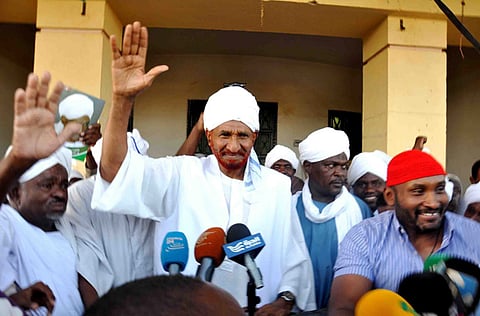Khartoum must do more before talks resume: opposition
Opposition wants other activists to be released, and newspaper to resume publishing

Khartoum: The release of Sudan’s former prime minister Sadiq Al Mahdi is not enough for resumption of a national dialogue aimed at resolving the country’s multiple crises, a leading opposition figure said Wednesday.
Al Mahdi was freed on Sunday, one month after state security agents detained him on treason-related charges in a case that sparked Western concern.
His arrest was one of several moves which raised questions about the government’s commitment to reform, despite talk of improved freedoms.
Ghazi Salahuddin Atabani, who founded the Reform Now opposition party in December, said that his and other parties which had joined the dialogue met Tuesday “demanding the government to reverse all its latest actions against opposition”.
The release of opposition Ummah Party chief Al Mahdi met one of those demands.
They also want authorities to free Sudanese Congress Party leader Ebrahim Al Shaikh and other activists, and called for the Al Saiha newspaper to be able to resume publishing.
State security agents ordered Al Saiha to halt its presses after it published allegations of official corruption.
Atabani said the parties which met on Tuesday also demanded that a joint committee of government and opposition parties be convened.
This means “that sitting with the government and resuming the dialogue is subject to resetting the button to the situation prior to the arrest of Al Mahdi and imposition of the other measures”, he said.
Atabani, a former adviser to President Omar Al Bashir, started Reform Now after the ruling National Congress Party expelled him for dissent.
The Al Bashir regime has faced mounting challenges since the separation of South Sudan three years ago.
In January, Al Bashir appealed for a broad national dialogue focused on attaining peace and renewal in the impoverished war-torn country.
Sign up for the Daily Briefing
Get the latest news and updates straight to your inbox


